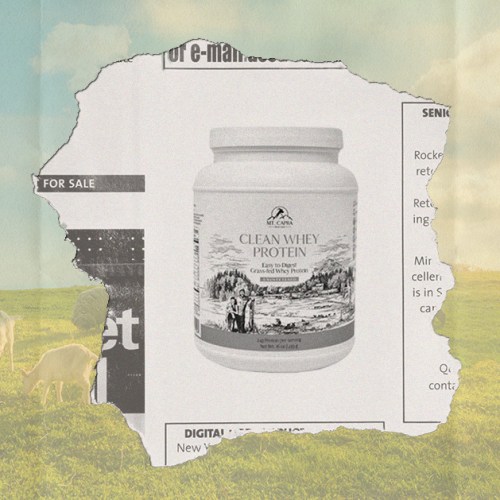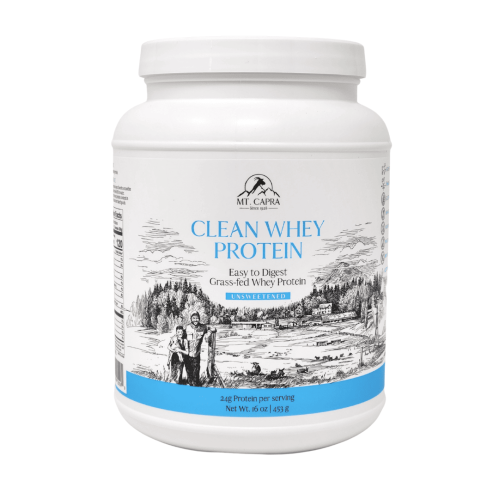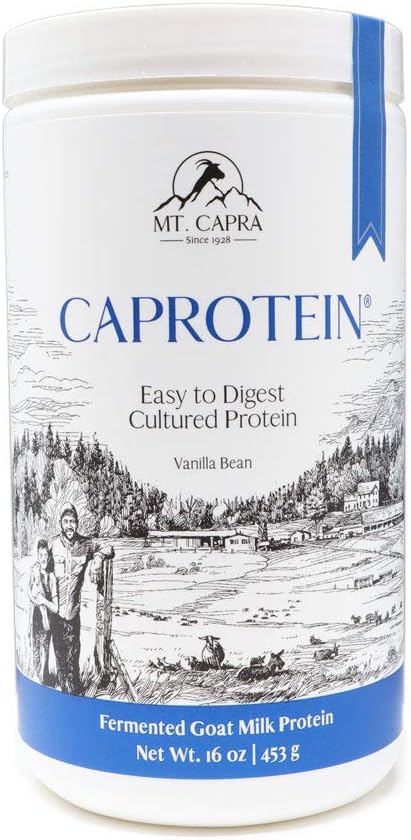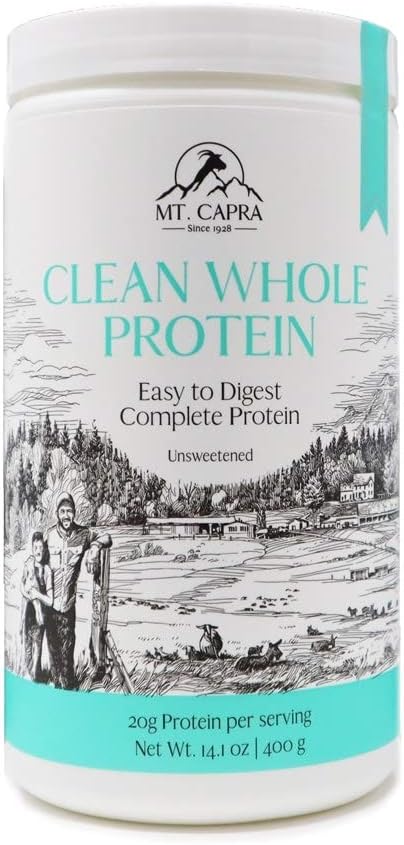Our editors independently select these products. Making a purchase through our links may earn Well+Good a commission
This Is the Goat Protein Powder a Functional Medicine Doctor Uses in His Quest To Stay ‘Young Forever’
Functional medicine doctor Mark Hyman consistently recommends goat protein brand Mt. Capra. Here's why he loves it (and why you will, too).

Happy cows might come from California, but happy goats are found in Washington.
Experts in This Article
functional medicine doctor and author of Young Forever
functional nutritional therapy practitioner and director of online experience at Mt. Capra
Nestled in historic Centralia, Washington, is the Stout Family Farm, which is home to roughly 500 grass-fed, free-range goats. First established in 1928, the farm is owned and run by naturopathic doctor Frank Stout, ND, and his son, Joe Stout, MS. The milk collected from these goats fuels the family’s line of goat protein powders, formulas, and supplements, aptly named Mt. Capra (the Italian word for goat).
The family-owned brand of goat protein products is a favorite among nutrition experts, including functional medicine doctor and author Mark Hyman, MD. On page 230 of his recently-published book, Young Forever: The Secrets to Living Your Longest, Healthiest Life, Dr. Hyman writes that he uses the goat whey protein from Mt. Capra in his morning smoothies, specifically in his “healthy aging shake” recipe. More recently, Dr. Hyman sung its praises this summer during his inaugural Young Forever Retreat, an immersive multi-day wellness program that explored the age-defying benefits of bodywork, cryotherapy, and nutritional IVs, held the state-of-the-art RoseBar longevity center within the impossibly luxurious Six Senses Ibiza.
Ahead, learn more about why Dr. Hyman recommends switching to goat protein and our honest review Mt. Capra Clean Whey Protein after adding to our own smoothies for the past few months.

Mt. Capra, Clean Whey Protein, Unsweetened — $44.00
Pros:
- Free of GMOs, antibiotics, and pesticides
- Easy to digest
- Available in two flavors, Unsweetened and Vanilla
- 24 grams of protein per serving
Cons:
- Pricier than some other traditional protein brands
- Does not contain casein

Mt. Capra, Caprotein, Vanilla Bean — $44.00
Pros:
- Free of GMOs, antibiotics, and pesticides
- Easy to digest
- Contains 3 probiotics to support gut health
- 13 grams of protein per serving
Cons:
- Pricier than some other traditional whey protein brands

Mt. Capra, Clean Whole Protein, Unsweetened — $60.00
Pros:
- Free of GMOs, antibiotics, and pesticides
- Easy to digest
- Combines casein and whey protein
- 20 grams of protein per serving
Cons:
- Pricier than some other traditional protein brands
ThirdLove Just Launched Bras That Help Balance Your Body Temperature—Here’s Why That’s a Game-Changer for Women in All Life Stages

These Are the Only Types of Underwear You Should Be Wearing, According to Gynecologists

These Are the Summer Essentials You Should Bring With You Every Time You Leave the House, According to a Derm and an RD

Why choose goat protein over cow protein
Casein makes up 80 percent of the protein found in dairy products, while whey protein makes up the remaining 20 percent. The main difference between casein and whey is that casein is more slower-digesting than whey; casein helps you stay fuller, longer, and reduces muscle deterioration by slowly providing cells with amino acids. Because it’s absorbed more slowly by the gut, it’s gentler on your stomach, too.
While cow milk typically contains A1 casein—a potentially inflammatory form of protein that causes stomach upset—goat milk contains A2 casein. The structure of this form of casein more closely resembles that of human breast milk and is easier to digest than its A1 counterpart.
Research shows that goat milk contains higher amounts of casein than cow milk, and has been proven to be therapeutic when used to manage allergies and beat inflammation. Goat milk also has higher levels of medium chain triglycerides (MCTs), a healthy fat that promotes brain function, fights inflammation, and supports food absorption.
Another reason to go goat: Goat milk is higher in branched chain amino acids (BCAAs) in comparison to cow’s milk. Goat milk has 0.76 grams of BCAAs per 100 grams, while cow milk has 0.7.
“If you’re an athlete, this is really important because branched chain amino acids are all about building muscle, especially for weightlifters, if your goal is to increase muscle mass, not just strength,” explains functional nutritional therapy practitioner and Mt. Capra’s director of online experience Shanda Combs, FNTP.
Aside from the numerous digestive perks of goat protein, there’s a few reasons why we think you should try Mt. Capra. Read ahead to learn more about what sets the brand apart from traditional protein brands.
3 reasons to try Mt. Capra goat protein
1. It’s ethically made
The roughly 500 goats that live on the Stout farm graze on pastures that are free of chemicals. Unlike many large dairy farms in the United States, Mt. Capra doesn’t use genetically-engineered hormones in order to boost milk production among the goats.
Not only are the goats well-cared for, but the land is, too. The Stout farm employs an eco-friendly rotational grazing method, wherein the goats feed across rotating sections of farmland. This method allows the grass, plants, and soil to recover more quickly, preventing the wind and water erosion that commonly occurs with unsustainable farming methods. Every two weeks or so, the goats are rotated to a new section, providing them with fresh land to munch on.
“It’s a regenerative farm,” explains Combs. “The belief we’re going off of is, ‘you leave the land better than you found it’. We don’t just put the goats on one section, and allow them to eat until there’s nothing.”
When the farm floods or grass is bare, the goats are fed hydroponically-grown organic barley fodder that’s free of pesticides and antibiotics. This nutrient-dense barely fodder packs more vitamin A than regular grass, and while it’s more expensive to create than traditional livestock feed, providing an optimum diet for the goats is well worth the effort.
“What you feed your livestock is huge,” says Combs.“The barley fodder gives them a way to still get green, growing grass.”
2. They control every aspect of the production process
The team behind Mt. Capra, unlike some other protein brands, makes decisions on every piece of the production process, from how often the goats are milked to how the powders are packaged.
“The milk is transported about nine miles down the road from the farm to our facility where we pasteurize it, and then separate it out into its different components,” explains Combs. “Then it gets dried on our front window dryer, which uses the refractive property of light, infrared light, and heat to dry the product. It’s a very different process from freeze-drying or spray-drying; it keeps more of the key nutrition intact.”
The result? A silky-smooth protein shake that’s packed with as many naturally-occurring vitamins and minerals as possible.
3. It’s free of additives and pesticides
Mt. Capra prides itself on being pesticide- GMO- and antibiotic-free, always. This dedication to all-natural, non-toxic production methods is what initially inspired Combs to join the company. Her family discovered the brand after searching high and low for an organic baby formula that was free of unnecessary (and potentially harmful) additives like soy and gluten.
“Baby formula on the market, even organic, can have other additives like soybean or canola oil, which are often genetically modified, but even not, it can also be too high in omega-6s and be inflammatory,” says Combs.
Sign up for the Well+Good SHOP Newsletter
Get exclusive deals on wellness, beauty, fitness, and food products that have been hand-picked by our editors.
Got it, you've been added to our email list.







